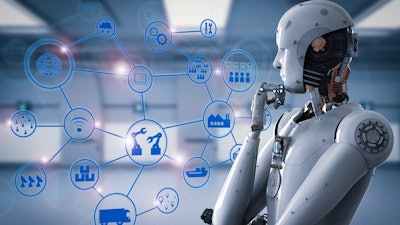
ARLINGTON, Va. - August 6, 2019 - ( Newswire.com )
New research from the MAPI Foundation shows that the introduction of artificial intelligence (AI) into the manufacturing value chain is significantly changing the nature of that sector's workforce. But rather than robots taking human jobs, new hybrid roles are emerging where humans enable machines and AI augments human capabilities.
The authors of How AI Will Transform Manufacturing and the Workforce of the Future, Robert Atkinson and Stephen Ezell of the Information Technology and Innovation Foundation (ITIF), say that within the next five years manufacturers will see significant growth in AI through machine vision, intelligent products, machine learning, and cobots, both within factories and throughout the supply chain. They project this will lead to a myriad of new types of AI-related jobs in manufacturing.
According to a survey of U.S.-based manufacturers, currently almost three-fourths of them have not yet introduced new types of AI-related jobs into their companies. In addition, only 20% have comprehensively re-evaluated job roles, titles, levels, and pay scales, in recognition of the need to attract employees with AI skills. However, Atkinson and Ezell note this is changing quickly.
The study emphasizes that more than 40% of manufacturers have already created "data scientists/data quality analysts" in their workforces, and 35% more expect to do so within the next five years. A sizable proportion of manufacturers are also creating "machine learning engineers or specialists" (33% today, 70% within five years), "collaborative robotics specialists" (29% today, 27% within five years), and "data-quality analysts" and "AI solutions programmers/software designers" (26% today, 40% within five years).
"Manufacturing is already facing a worker shortage, and advanced technologies create additional technical and workforce challenges to find and retain talent with the necessary digital skills," observed Stephen Gold, president of the MAPI Foundation. "Companies that acquire and cultivate new digital-related skills will have a distinct advantage as AI reshapes the industry, including identifying new roles for AI-focused jobs such as leading AI strategy and supervising implementations."
The report shares six recommendations for business leaders as they integrate new AI-related strategies and technologies:
1. Create teams to drive digital transformation in the enterprise.
2. Define an "AI governing coalition" for AI transformation.
3. Evaluate AI and workforce transformation readiness.
4. Set measurable objectives for digital and AI transformation.
5. Redefine digital and physical product innovation processes.
6. Overinvest in communication for change management.
"Most manufacturing companies are only beginning to realize the opportunities possible with AI," said Ezell. "Businesses that want to remain on the cutting edge of manufacturing innovation need to implement policies that support and enable the use of the technology throughout their organizations."
Learn more about "Building the Future of Work in the Age of AI: How New Jobs and Technologies Will Transform Manufacturing" at MAPI's annual executive summit ManufacturED Sept. 16-18, 2019, in Chicago.
How AI Will Transform Manufacturing and the Workforce of the Future was conducted in partnership with ITIF and included a survey of MAPI members to understand the current and future state of AI for manufacturing.
The MAPI Foundation is thankful for the support of the companies that underwrote this report: AMETEK Foundation, Barnes Group Inc., Belden, Chamberlain Group, Columbus McKinnon, Cooper Tires, Evoqua Water Technologies, Hubbell, Kaman, Modine Manufacturing Company, Moog, MSA Safety, Mueller Water Products, Nordson, Parker Hannifin, Rockwell Automation, S&C Electric Company Fund at The Chicago Community Foundation, and Victaulic.
About the MAPI Foundation The MAPI Foundation is a 501(c)(3) nonprofit subsidiary research organization of the Manufacturers Alliance for Productivity and Innovation (MAPI). The Foundation researches the economic impact of manufacturing, including the implications of government policies and the success drivers that keep the industry competitive. Its mission is to showcase manufacturing's impact on the global economy to help business leaders, policymakers, and the general public understand manufacturing's impact on everyday life. mapifoundation.org.
About MAPI Founded in 1933, the Manufacturers Alliance for Productivity and Innovation is a nonprofit organization that connects manufacturing leaders with the ideas they need to make smarter decisions. Its mission is to build strong leadership within manufacturing to drive the growth, profitability, and stature of global manufacturers. mapi.net.
About ITIF
The Information Technology and Innovation Foundation (ITIF) is an independent, nonpartisan research and educational institute focusing on the intersection of technological innovation and public policy. Recognized as the world's leading science and technology think tank, ITIF's mission is to formulate and promote policy solutions that accelerate innovation and boost productivity to spur growth, opportunity, and progress. Itif.org.






















